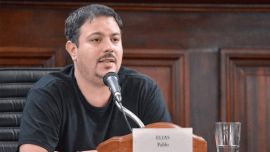All eyes will turn toward Mendoza Province tomorrow, when more than 1.4 million voters will head to the polls for crucial gubernatorial elections that could foreshadow the outcome of next month’s presidential race.
Victory for the incumbent Radical provincial administration would revive Mauricio Macri’s faltering chances of re-election, shattered after trailing his Frente de Todos rival Alberto Fernández by over 15 points in last month’s PASO primaries. Conversely, an opposition triumph from the nation’s fifth-largest electorate would boost the latter’s momentum to an almost irreversible degree.
Fernández, the clear frontrunner in the October 27 presidential vote, has recognised the importance of this race, visiting the province several times during campaigning.
Four candidates are seeking to succeed current Radical Governor Alfredo Cornejo – his party colleague Rodolfo Suárez, the current mayor of Mendoza City, running under the Cambia Mendoza label; Kirchnerite senator Anabel Fernández Sagasti. for Frente Elegí; national deputy José Luis Ramón for Roberto Lavagna’s Consenso Federal; and outgoing provincial senator Noelia Barbeito for the Frente de Izquierda.
Cambia Mendoza, linking the provincially ruling Radicals with Macri’s PRO, topped the provincial primaries in June, obtaining 42 percent of the vote, followed by 35 percent for Frente Elegí. The results have sparked renewed hope among Cornejo’s ranks, who will be hoping to stretch their lead tomorrow.
Nevertheless, Alberto Fernández’ stunning victory in the PASO primaries has also raised expectations among the provincial opposition. Not only did Fernández triumph nationwide but he also won in Mendoza, obtaining 41 percent of the vote to President Macri’s 37 percent.
A national campaign
Clinging to the coat-tails of Fernández, Mendoza’s 35-year-old Kirchnerite candidate Fernández Sagasti (no relation) has tried to make the campaign as national as possible, highlighting the economic woes of the Macri administration and trying to take as much advantage as possible of Fernández’ three visits to Mendoza.
“Mendoza has applied for a long time the same policies which caused the national disaster we are now experiencing. I hope the first thing the citizens do is to vote for Anabel [Fernández Sagasti],” Alberto Fernández recently said.
Vice-presidential candidate and current senator Cristina Fernández de Kirchner also visited Mendoza in July, when she introduced her book Sinceramente and enthusiastically supported Fernández Sagasti.
On the other hand, aware of Macri’s negative results in the primaries, Cambia Mendoza’s Suárez, the opinion poll favourite, has tried to distance himself as far as possible from the national context, highlighting his record in Mendoza city as well as Cornejo’s in the province.
Neither Macri nor national government officials visited Mendoza during the campaign.
Nevertheless, this doesn’t mean Macri will not be closely following the results tomorrow night. “I have the enormous challenge of taking office after the government of Alfredo Cornejo, who raised the bar. We are part of a team with administrative experience,” said Suárez at a recent rally, questioning the state of the province when Cornejo took office in 2015 after two previous Peronist terms.
Trying to take the edge
Mendoza is Argentina’s fifth-largest electoral district, with 1.4 million registered to vote this time out. As well as voting for governor, the province will also choose new lawmakers, senators and mayors in 14 municipalities, all of which are currently ruled by the Radical party or its allies and account for a large percentage of the votes.
The four main gubernatorial candidates took part in a debate last Wednesday, agreeing on some issues but disagreeing over others, especially education, health, mining, security and abortion.
Suárez questioned Fernández Sagasti over security, claiming that when Cornejo took office the police “had no equipment to work with” due to the previous Peronist administrations. Not referring to the issue, Sagasti said the “aggression should be directed towards Macri’s policies.”
At the same time, Suárez and Ramón both opposed the legalisation of abortion, while Barbeito and Sagasti claimed the issue should be addressed and seen as a public health problem in order to “save the lives of thousands of women in Mendoza.”
Mining was also a conflictive issue at the debate. Barbeito questioned Suárez and Sagasti for their alleged attempts to amend the provincial law which bans open-pit mining. The latter said the law had to be respected, while Suárez claimed that if elected, he would enforce all necessary controls on the sector.
A segment of the debate included a set of informal questions, which were questioned by local feminist groups. The women were asked repeatedly about their previous partners while the men were asked to play a game in which they had to choose either Barbeito or Sagasti as lovers if an apocalypse occurred.
Comunicadoras Mendoza, a group of feminist journalists from Mendoza, criticised in Twitter the questions asked by the journalists at the debate and said, “women in politics usually have to deal with being banalised and seen as objects.” –
TIMES/TELAM


























Comments